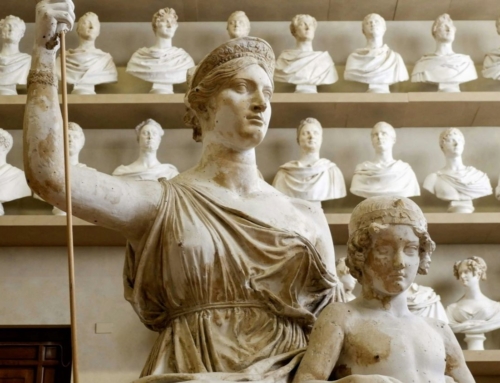“Pilate said to him, ‘What is truth?’” (John 18:38a)
In a few days, we will see Jesus standing in the praetorium and Pontius Pilate, a government official and not a philosopher, asking Him this question. Neither Pilate nor the ancient philosophers may have been able to associate truth with God as Christians know Him, but a philosophical understanding may help us to articulate some of the why and how beyond the what of Pilate’s question.
Nowadays, the word “transcendental” is often linked to certain kinds of Eastern philosophy or meditation, but Aristotle and other ancient philosophers used it in the science or study of being or existence itself. For Aristotle, the transcendentals are properties of being (truth, goodness, unity, and beauty) which can be found in everything that exists. For Pilate and for many of our contemporaries, the answer to “What is truth?” may be something like “the opposite of lies” or “something that really happened;” but for Christians, truth is more than that, it deals with the mystery of God’s existence, which is never easy to articulate.
To begin, the word “good” can be used in many ways, but absolute goodness itself is that which Christians know as God. “Beauty,” it may be said, “is in the eye of the beholder,” but Plato understood perfect beauty as an eternally existing form, which all material reality tries to express. Unity or oneness is difficult to describe, but easy to understand. If we take the idea of the color orange, we can say that orangeness is one, it has a kind of unity. There are shades of orange (light orange, dark orange, burnt orange etc.), but there is only one idea of orange.
St. Thomas Aquinas adds two more transcendentals to Aristotle’s list: thing and something. Thing or realness adds to our understanding of being that what has existence is a thing or has reality. A non-thing cannot have existence, nor can a thing be anything without existence. The transcendental “something” adds the nuance of particularity, as everything we can call a thing or real can also be called this particular thing.
The transcendentals are not things themselves, but properties of being by which man understands creation in relation to God. We mentioned above that the basic definition or standard for goodness was God. We also mentioned Plato’s idea of the form of beauty itself, but Christian philosophers could say that God is perfect beauty, and its basis for our understanding. God is also being itself, or the source of being, and the One who gives existence to everything else. God’s unity, reality and particularity are above our own, as there is no greater unity than the unity of God’s simplicity, and our reality is actually a participation in God’s reality. It is not independent from Him, and nothing could be more real than that. Finally, as we said, anything which is real or is a thing can also be called this particular thing, and if God is the most real, then His particularity must also be the greatest.
Now let us return to Pilate’s question. Just before his arrest, Jesus prays this prayer aloud:
They do not belong to the world any more than I belong to the world. Consecrate them in the truth. Your word is truth. As you sent me into the world, so I sent them into the world. And I consecrate myself for them, so that they also may be consecrated in truth… I made known to them your name and I will make it known, that the love with which you loved me may be in them and I in them (John 17:16-19, 26).
We have responded to Pilate’s question, but it feels like something may be missing, doesn’t it? Let’s see, truth, beauty, being, oneness, reality, particularity… LOVE! While love may not be a transcendental, it has something in common with them, in that it is something that belongs to God in a preeminent or perfect way. In the first letter of John we hear, “Whoever is without love does not know God, for God is love” (1 John 4:8). And again, “We have come to know and to believe in the love God has for us. God is love, and whoever remains in love remains in God and God in him… We love because he first loved us” (1 John 4:16, 19). Can it be that whoever does not know God as Christ does, does not know true love? Let St. John have the final word:
For God so loved the world that he gave his only Son, so that everyone who believes in him might not perish but might have eternal life. For God did not send his Son into the world to condemn the world, but that the world might be saved through him (John 3:16).
✠
Image: Antonio Ciseri, Ecce Homo







